I referenced this in the last piece, but I’ve gone on something of a fitness JewTube binge as of late, and I can safely say that almost all of it is pure garbage. This is not to say that there isn’t good information out there. The problem is that we’ve had 95% of the good information that we need, especially on weight lifting, since the early seventies. It basically amounts to “start light, lift more, keep going, don’t skip compound lifts.”

Above is what SchlomoTube gave me when I searched “science based.” This was the very first result. Similar results filled out the rest of the continuously scrolling page.

I didn’t type “science based workouts,” or “science based testosterone boosting.” I typed “science based,” and got all this.

I figured my results must be tainted, due to having searched for relatively similar content. I fired up the VPN and below you see the very first result.

The rest of the results weren’t quite as bad, but workout related content still made up over half of the results.
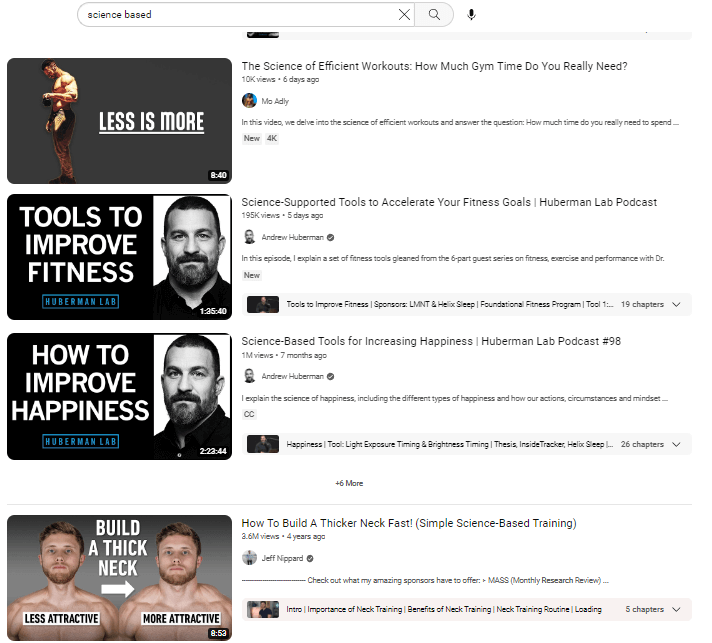
This is astonishing, especially considering how difficult it is to prove anything even slightly nuanced in a field like exercise science.
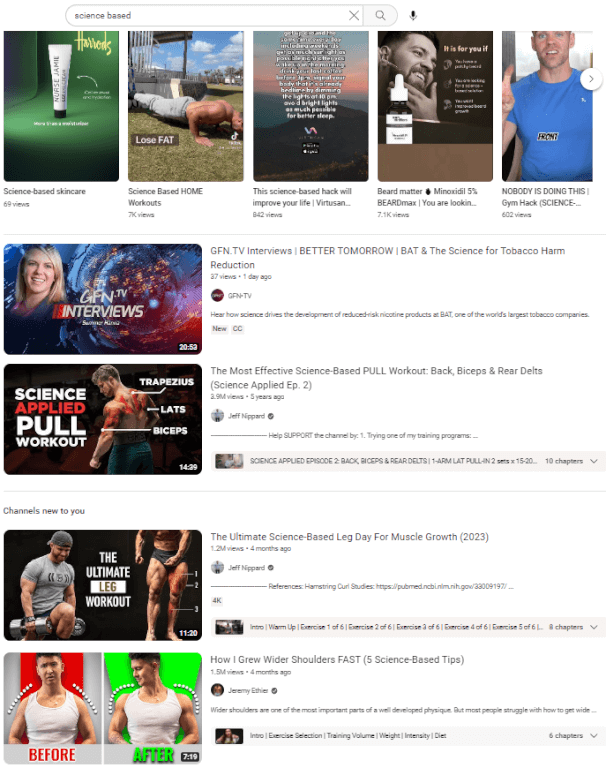
The guy below, Alexander Bromley, does a decent job explaining why. I have to mention a great part starting around four minutes in where he makes fun of some vibrating plate product. The product makers referenced a study showing that vibrating plates activated lots of muscles. They then used this to claim that vibrating plate squats are what everyone should be doing.
Now how many world champions have been built by standing on vibrating plates? How many world record performances? How many breakthrough physiques? The answer is absolutely zero. In the context of the real world when it comes to application there are so many other variables that are more important that it’s not even really worth talking about.
But if you fixate on these studies, and you’re in the business and incentivized to extrapolate more “truth” to them than the parameters of the study will actually allow that’s a problem.
At the nineteen minute mark he has this to say.
What we consider the gold standard of execution, things like double blind randomized studies, can actually be very limited if you reach a certain threshold of complexity. There are going to be times where the best scientific application actually doesn’t happen in a controlled laboratory study.
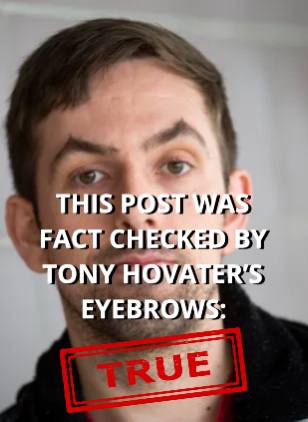
Is there any scenario where a single one of you would walk into a Gracie Jiu Jitsu gym and ask “where are the peer reviewed studies to back up what you guys are doing?” The idea seems ludicrous on its face. We have a very old method of doing something that has been proven in the field over and over and over. We had our sample size. All of the MMA fighters in the 90’s. We had them go through a sieve to see who had the best methodologies.
This is a form of science. You already had an incentive to make the best possible product that you could. That incentive was basically to win a tournament. If you won a tournament you got to stick around and move on to further fights. The things you did to win got to move on to future fights. If you were biased, if you were an ideologue, if you had bad methods, you got your ass kicked and you didn’t get to move on to further fights and you were never heard from again.
But nowhere does any piece of mixed martial arts have any technique to credit to formal academic research. That doesn’t mean its not valid. That doesn’t mean it’s not scientific. It just means that the most robust, meaningful information could not be isolated in a lab setting. Maybe at some point in the future you’ll be able to clone people into a thousand versions of themselves and run through a whole bunch of hypotheticals with lab people in coats. But that day is not now, so we have to meet reality on its own terms.

This process of trying out different things and seeing what combinations work is how neural net “AI” improves itself. Sure, I’ve written more than one piece critical of the hype, but there’s no question that this iterative process works to optimize at the very least to a local maximum that can in some cases be highly performant. That’s how you get AlphaZero crushing Stockfish back in 2017, both of which are easily superior to any human player.
Speaking of chess, Magnus Carlsen is clearly the best chess player in the world. Did he get that way by reading academic studies? Was he a part of any randomized control trials? Were there any rigourous studies that “scientifically,” proved the right way to play that he researched? I don’t think there is any reason to believe this.
Let’s say that we designed a study that was supposed to “prove” which move is the best to play on move 1. We could do this quite easily. Simply figure out all the possible moves that can be played, go through a huge database of games, see what the results were, and conclude that x move is the best. This type of study is interesting, which is why it’s already been done for chess. However, it shows us little that we didn’t already know. Good players already knew that e4, d4, Nf3, c4, and g4, are the most consistently good opening moves. That’s why they are the most played opening moves.

Na3 is considered the worst opening move in chess, which is why we have to scroll down the list to find it. I’m sure we’ll see black win the majority of –
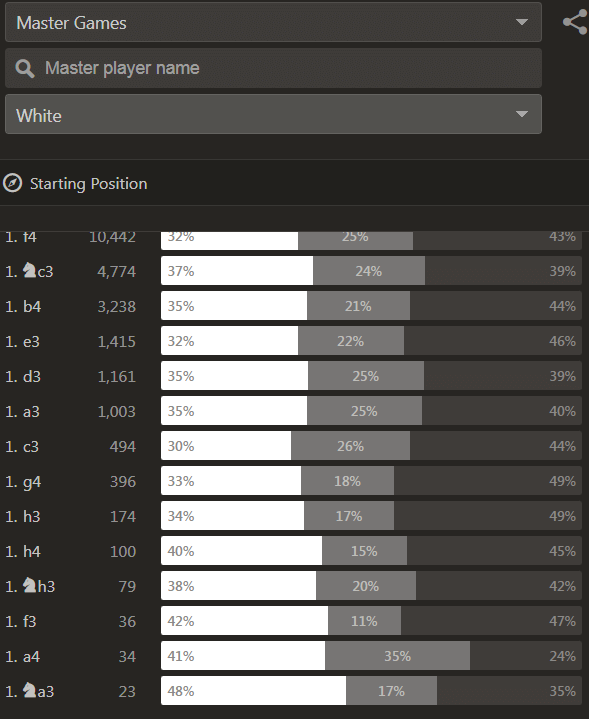
Despite being the highest scoring opening for white, it’s played the least amount, with just 23 games in the database. I guess this means that master level players are all a bunch of dumb dumbs who are UNSCIENTIFIC in their chess playing. According to our SCIENTIFIC ANALYSIS, you can get a huge advantage over these guys just by playing literally the worst opening move available.

But actually no, you can’t. There are so many variables in chess that aren’t controlled for after looking at the opening move that this analysis satisfies nothing more than idle curiosity. The best opening moves for white and black – at least the first few – were figured out more than a century ago by quality chess players who used their experience and intuition to tell them what worked and what didn’t. While “bro science,” is most definitely a thing, if professional bodybuilders are all saying one thing, and “the science!” is saying another, I would go with what the bodybuilders are saying with such a nuanced, complicated subject.
If we wanted to do a scientific study for chess, we might find more value in a study that was a year long, and compared two different training regimes, with the Elo ratings before and after as the measuring stick. Even then, it would be quite difficult to definitely say that method x is better than method y, even with a very large sample size. It’s more likely that having a coach who can personalize your learning is the best of all, because everyone has unique strengths and weaknesses.
Besides, anything that is objectively good for learning has undoubtedly been long since incorporated into the chess cannon. They say that social science is incapable of proving anything but the blindingly obvious, and the same is true for a lot of these complicated and nuanced subjects. Obnoxious reddit-tier midwittery is not a substitute for years of experience.
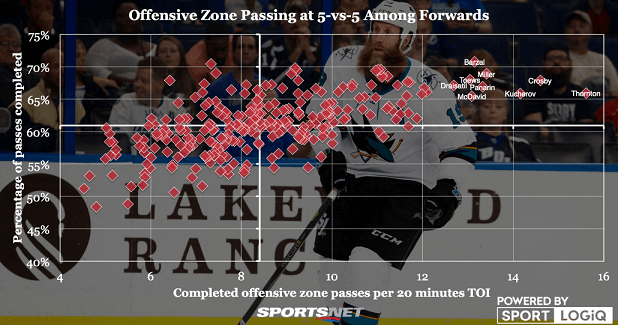
You see this kind of scientistic bloviation everywhere these days. Above is a screencap from a Sportsnet article that purports to show the playmaking ability of various forwards in the NHL. They do this by calculating how many passes they complete in the offensive zone per 20 minutes of time on ice.

Of course some of the names at the top, Thornton, Crosby, McDavid, are generally acknowledged to be fantastic playmakers. Everyone already knew that long before his stupid stat came out, and his measurement is so crude that even he admits how absurd some of the results are.
There are still some surprising names in there, especially a guy like Jordan Weal way up in the top five, or Vladimir Sobotka in there after having a terrible season. But overall the players in here make sense, especially if we remember that this is all about pass accuracy, even if we’re weighting by pass type.
Jordan Weal was a perennial AHL/NHL tweener, who got booted from the NHL age 28, and currently plays for the Moscow Dynamo in the KHL. His NHL career totals are 218 games played, 32 goals, 37 assists. That’s about one assist every 6 games. For reference, Connor McDavid had 89 assists last year in 82 games, along with 64 of the prettiest goals you will ever see.
Let’s check out Vladimir Sobotka. 118 assists in 548 NHL games, before getting cut, playing a year in the Swiss league, and now two in the Czech league. This sperg came up with a statistic that shows two guys who got booted from the NHL as being top five playmakers in the NHL.

I’ve never played in the NHL, but I can assure any coaches that these autistic stats won’t help your team to play better, nor will it help you find diamonds in the rough if you’re a GM. What will actually help with both is film study, and then designing drills to help the players improve in controlled, game-like like situations. The same is true for BJJ, as Bromley mentions. How do you improve at BJJ? You compete, you spar, and you do micro-sparring drills, like starting off in a partially completed triangle choke and playing it out from there.
Even if a stat tells us something, it doesn’t follow that this is useful information. Let’s say that we find out that the number of passes that a hockey team makes per game is strongly correlated with winning percentage. First of all, we would need the stat to take into account powerplay time, puck possession, and a whole host of other variables to mean anything at all. But even after doing that, what does this tell us? Should we get the players to just pass the puck back and forth randomly to bump those numbers up? How exactly are the players supposed to play better because of this “scientific” study that we did, which “proves” that they should pass more?
I really ****ing hate the thin veneer of scientific authority draped over complete nonsense, and it’s absolutely everywhere on the junk modern internet. Above is a video with a clickbait title almost unrelated to anything neuroscientist Anthony Huberman actually says. However, what he says is so vague and full of caveats that he might as well have said nothing. The only real takeaway is “you should consistently get a decent amount of sleep.”

YouTube is as full of these nothing videos on various topics as they are the Reject Modernity, Embrace Steroids garbage from the Tate Enjoyers. To they extent that they ever say anything, they contradict what others have said, and probably themselves. Even the Alexander Bromley guy who I praised above is desperate to massively overcomplicate something as simple as bench pressing. Below we see another video of his.
Remember, these are MANDATORY for building POWER in the bench press. We know that because no one ever developed power in the bench press without doing this. He proves this by – oh wait, he never even attempts to prove this bizarre assertation. Sponsor incoming!

One of the top comments:
I don’t doubt that Bromley has plenty of experience, but even if everything that he said was true, what percentage of the 47 thousand viewers are powerlifters who were mysteriously unaware of the MANDATORY variations that they must to do bench more weight? I suspect quite a few, since we see comments from people admitting that they don’t even bench at all.

Oh and his sponsor? That would be BoostCamp. Join now, and you can be inundated with hundreds of people all pushing their own idiosyncratic workout routines on you that you don’t need. At the end of his spiel he says the following.
Not only does BoostCamp have a stellar product, but their support is the only reason this channel exists. So thank you the viewer, and thank you to BoostCamp. Check it out today, the link is in the description.
When he tells me that the only reason the channel exists is because of BoostCamp, I believe him.

Not everything this guy says is worthless, but he’s run into the same problem that all these niche content creators eventually face. There simply isn’t that much to say about fitness/sleep/health/whatever. Certainly not 455 videos, which is Alexander Bromley output to date.

The reason why people get personal trainers is to personalize their training, because we aren’t all the same. Everyone’s muscles grow at different rates, in response to different stimulus, and with different recovery times required. I don’t think that there’s anything anyone can do but the basics, and then tailor it to their own bodies. But what you could try is watching all 479 of Alexander Bromley’s videos and overcomplicating the process of going to the gym and lifting things. Then do AthleanX. Then do Ryan Humiston. Speaking of which, did you hear about the REVOLUTIONARY new fat loss technique that is super practical for everyone and based on SCIENCE! It’s called “throw on a weighted vest and walk for 15,000 steps per day because that’s definitely something you can all work into your lives.”
Jaime, can you get a screencap of the video blurb please?
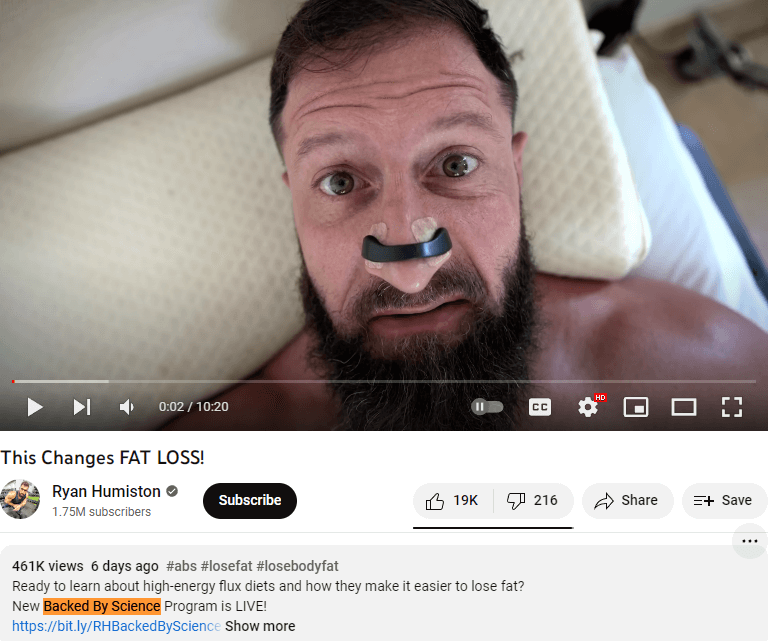
There has never been a randomized control study that found that people who watch Fitness YouTube get better results in terms of bodyfat % and muscularity, versus people who just go to the gym, lift things, and don’t eat garbage. Speaking of eating, I promised to takedown this annoying twerp, but couldn’t transcribe him properly when writing the first article. Let’s fix that now.
Intermittent fasting does more harm than good from the current research we’ve got, which is why the latest clinical guidelines do not promote it.
As a reminder, I’m not on any sort of diet other than the “eat when you feel hungry and no junk food,” diet. Doing this I only have one meal per day about half the time, and have that plus whatever brunch I feel like every other day or so. This essentially works out to either intermittent fasting, or OMAD (One Meal A Day), which are both somewhat trendy things that some people are into.

Not all twelve pictured.
To be clear, I’m not starving myself. Yesterday I felt quite hungry around noon, so I soft-boiled a dozen eggs. I proceeded to eat nine of them, after turning most of them into deviled eggs. Today, around 2pm, I polished off the last three deviled eggs. They were thoroughly delicious, although I might be adding store bought mayonnaise onto the “junk food” list after looking at the back of the tin.
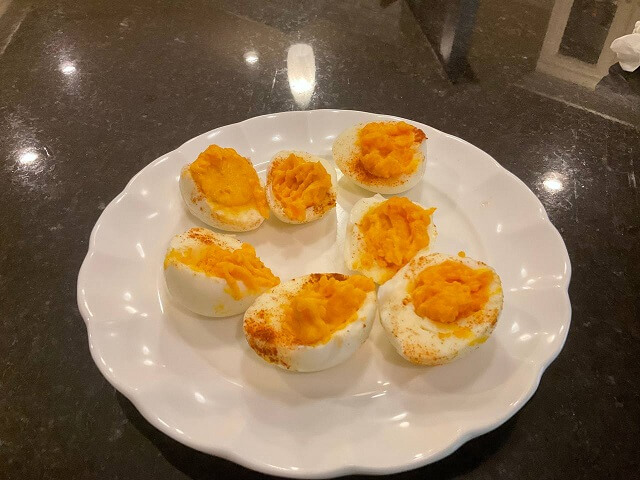
Following my “diet,” which is little more than cutting out the junk and listening to my body, I have lost more than ten pounds total. The weight loss continues to this day, while I simultaneously see my strength rapidly improving in the gym. I’m losing weight while enjoying eating. I might even be enjoying food more, since I’m usually somewhat hungry when I eat.
However, some fag named “Dr Brad Stanfield,” tells me that the LATEST CLINICAL RESEARCH proves that my eating habits are going to cause me to spontaneously combust sometime in the next seventeen minutes. What super duper serious studies could the Smart People have done to prove this?
(1:06) When examining the human research, intermittent fasting looks incredibly promising. From this 2020 meta-analysis it says that Time Restricted Feeding achieved a superior effect in promoting weight-loss and reducing fasting glucose.
Brad Stanfield has a really annoying habit of zooming the camera all over the place, even when showing screencaps, which he combines with an absurd amount of quick cuts. However, I managed to snag this screenshot of the first meta study that he references.
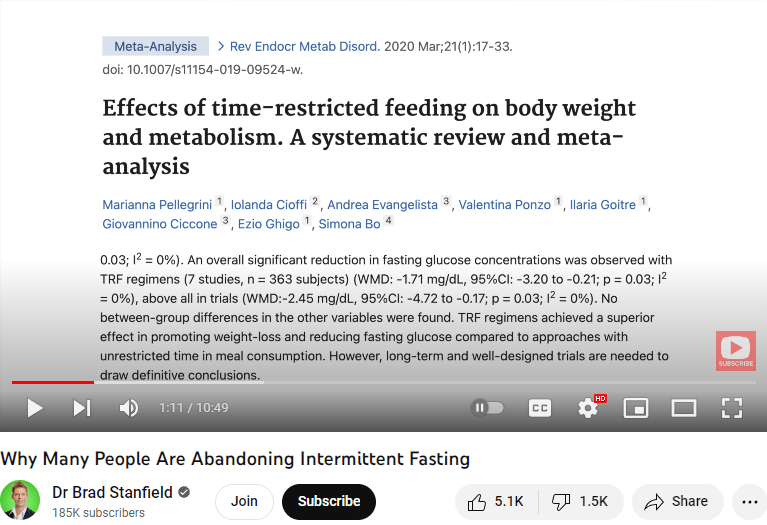
I’ll quote the relevant part.
An overall significant reduction in fasting glucose concentrations was observed with TRF regimens in all trials. No between-group differences in the other variables were found. TRF regimens achieved a superior effect in promoting weight-loss and reducing fasting glucose compared to approaches with unrestricted time in meal consumption. However, long-term and well-designed trials are needed to draw definitive conclusions.
In other words, when we compare people doing intermittent fasting to people who are not doing intermittent fasting, we see that they have superior weight-loss and fasting resting glucose. This is a fancy way of saying “this works and maybe you should do it.” Can’t wait until Dr. Stanfield unveils the horrible twist!
That all sounds wonderful, but when you dig a little deeper you find that less calories were consumed in the TRF groups. That leads to the conclusion that TRF appears to be effective at weight loss probably because less calories and less liquids are consumed.
In other words, it works.
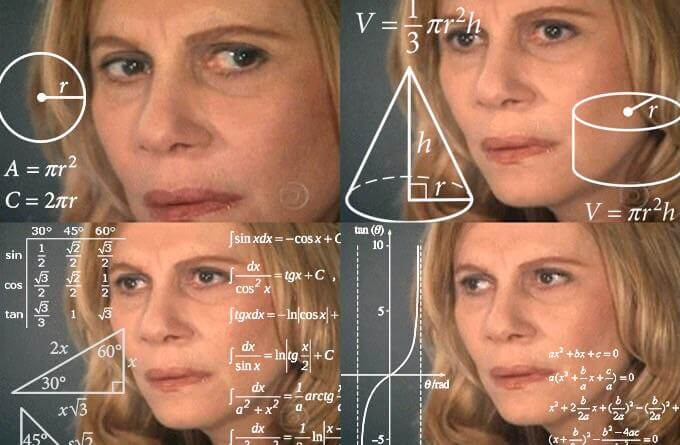
I’m perfectly fine with someone saying that my diet works because, when I only eat when hungry, I consume fewer calories. If some faggot were to come along and say “well but Ackshually Dr. Shekelstein, if we controlled for calories you’d be no healthier when eating six meals per day,” I could not possibly imagine caring.
That analysis matches a 2021 Cochrane review, which is the creme de la creme of meta-analysis. The review found that intermittent fasting did not offer any additional benefit compared to energy restriction diets.
“This super easy strategy to get people to eat less doesn’t have any benefit over forcing people to eat less in a controlled lab environment.”
Have these people never counted calories before? Here, let me show you a video of how tedious and obnoxious the process is.
All you have to do is magically know all the calories for the dishes that you’re eating, all the time, and never forget to count absolutely everything that goes into your mouth, to near perfect accuracy.

See that delicious chicken, pepper, and mushroom risotto above? I made that for myself and others last night. Apparently what I should have done before eating it was weigh it all on a food scale. Sorry, let me back up.
First, I need to have a spare bowl next to the food scale, to normalize the weight. Then I need to weigh my full bowl, to see how much risotto is actually in it. I need to continue doing this if I feel the need to get seconds, and for every additional course.
Second, for the risotto dish as a whole I need to figure out how much of every single ingredient is in the pot itself. That means calculating the precise amount of butter, garlic, onion, yellow peppers, mushrooms, chicken, chicken stock, parmesan, and of course arborio rice while cooking it.
Some may be fairly easy, such as the 750 grams of arborio rice. Others, like butter, are downright impossible. I add copious amounts of butter to every pan, such as the peppers which get cooked separately and then thrown in, and sometimes add more by feel if I think the ingredients need it. Similarly, I add mushrooms only once, but whatever amount is needed to fill the pan and soak up excess garlic-y butter when cooking the chicken. The stock is added by feel, and varies each time I make this dish. And of course the parmesan is added to taste.
The chicken and rice are sold by weight, but the mushrooms, peppers, onion, garlic, butter, and stock all vary. I can’t just go online to figure out how many calories were in them with a high degree of accuracy. Instead, I need to break out the food scale again and weigh each individual ingredient one by one as it goes into the pan. This is totally realistic, considering that my cooking area looks like this and that doesn’t even include the cutting boards where I’m dicing up the last bits that need to go into the dish while frantically trying not to burn anything, and cook everything evenly. 
Part of the above clusterfuck is that I was actually making two risottos, one for a guest with some dietary restrictions. But even making one at a time is quite attention consuming. Apparently, I’m suppose to be weighing every last bit of everything that goes into the dish while in the middle of cooking it?

Even if I had done that, I would only have a rough approximation of the calories that are in each bowl, done by dividing the weight of the food in the bowl with the total weight of the dish. Considering that risotto is hot and wet, the weight of the dish will vary depending on when it is weighed. The same is true for the food in your bowl. Dish it and weigh it immediately. Then wait a minute and weigh it again. What you’ll find is that the dish has fewer calories weighs less because some water evaporated.
Again, I’m supposed to do all this while entertaining guests and not coming across like a fucking nutcase. This is already laughably impossible, and if we’re off by just 10%, that works out to 300 calories from a 3,000 calorie plan, which is probably most of our planned caloric deficit.
I need to do all of this, and my reward is that I can eat three meals per day, which includes forcing breakfast down my throat when I’m not hungry, and feeling unwell afterwards. Or I could get all the benefits of this by just skipping the breakfast that I don’t feel like eating in the first place. Then this credentialed faggot comes out and tells me that I should stop just skipping breakfast and instead turn eating into a full time job just to get literally no additional benefit and feel like trash.

You may not like it, but this is what peak SCIENCE! looks like.
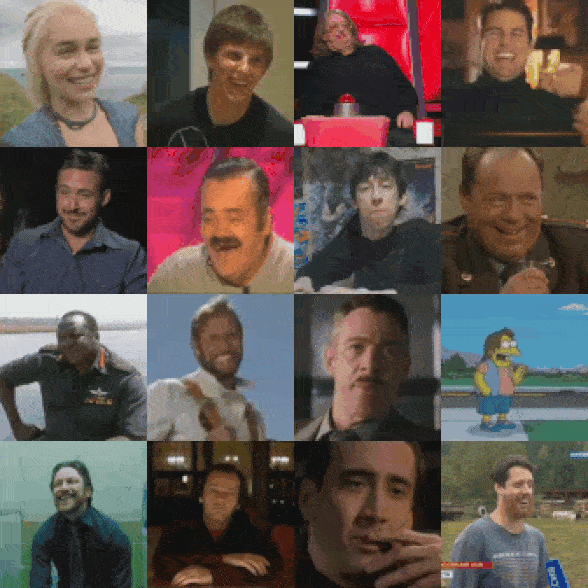
Seriously, watch this video again and look at how obnoxious the process of counting calories. I could do all this, or only eat when hungry. It’s a real tough decision that one.
I’m skipping ahead to the last part of Dr. Brad Stanfield’s video where he explains that eating late in the day is bad because SCIENCE!
The next issue is that most people who practice time restricted feeding eat between 12PM and 8PM, the so-called 16:8 protocol. Or they only have one meal late in the day. But we know that late night eating is terrible for the body.
A study published in 2007 showed that a single large daily meal it elevates blood sugar levels compared to those consuming three meals a day. The same findings were found in a 2018 paper, demonstrating that a meal in the evening exacerbates high blood sugar levels.
And?
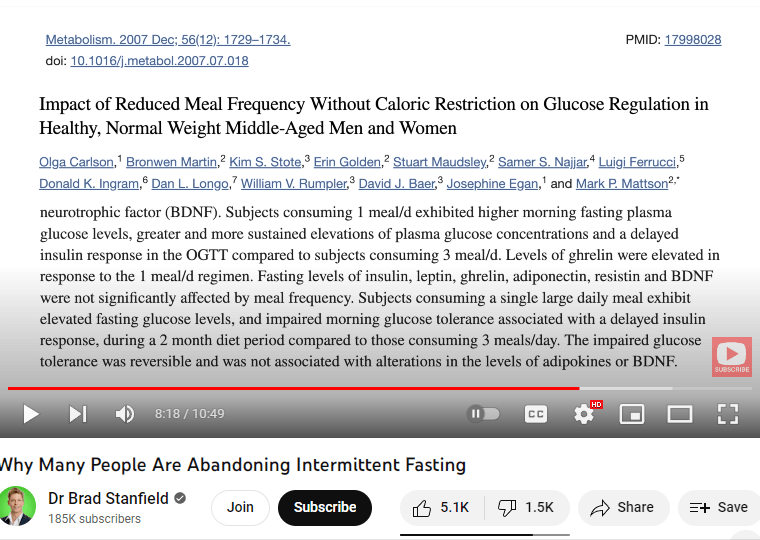
I thought we were talking about bodyfat percentage. Now he’s cherry picking studies which found that eater fewer meals might result in higher blood sugar levels? What does this have to do with the price of tea in China?
Furthermore we’ve got multiple studies showing that skipping breakfast is a terrible idea. In 2017 they found that skipping breakfast increased bodyfat percentages.
Below is the screencap of this study. We don’t get any information on how this study was performed. Was it a questionnaire? Was it a randomized double blind study? Was it a thought experiment? We don’t know, because Brad Stanfield doesn’t tell us.
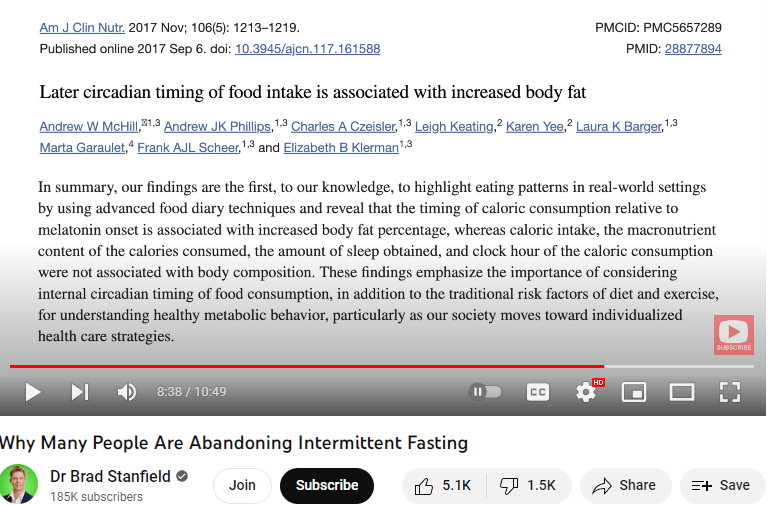
However, their abstract is so ridiculous that I feel the need to quote it in full.
In summary, our findings are the first, to our knowledge, to highlight eating patterns in real-world settings by using advanced food diary techniques and reveal that the timing of caloric consumption relative to melatonin onset is associated with increased body fat percentage, whereas caloric intake, the macronutrient content of the calories consumed, the amount of sleep obtained, and the clock hour of the caloric consumption were not associated with body composition.
This “study” managed to find that caloric intake is not associated with “body composition,” and neither is the amount of sleep you get, or the hour at which you consume the calories. Eating when under “melatonin onset,” is the only thing that makes you fat, even though, again, the hour at which you eat doesn’t matter.

None of that makes the slightest bit of sense to me. It also clearly contradicts Brad Stanfield who argued – and I agree with this – that caloric restriction is necessary for the positive aspects of time restricted feeding, most relevantly fat loss. This study that he flashes across the screen says “no, eat however many calories you feel like, just not when you’re experiencing melanin onset.” And again, they don’t explain how they got any of these results, especially the melanin levels.
Jaime, can you pull up Stanfield’s interpretation of this study again please?
In 2017 they found that skipping breakfast increased bodyfat percentages.
That’s like, really not the conclusion I would have drawn from what looks like a ridiculous junk science study, but you do you.
Stanfield continues.
A 2019 paper showed impaired insulin responses. Another 2019 paper showed that average blood sugar levels over 24 hours were higher in the breakfast skipping group, compared to the group that ate three meals a day. And in 2020 a further study concluded that skipping breakfast was independently associated with worse blood sugar level control.
So blood sugar levels are somewhat higher. And? Are they within the healthy range? Is a medical doctor trying to get us to believe that blood sugar levels should be zero? Did they control for calories (probably the only benefit of restricted time eating) for the other groups? What the hell does this have to do with fat loss?
Furthermore, were many of the patients in the study not the type of people to naturally want to skip breakfast? Because I want to see the study where we ask people to only eat breakfast if they get hungry, and go from there.
I’m sure Dr. Brad Stanfield will knock all these questions out of the park. After all, he’s telling us that skipping breakfast is terrible. I’m sure there will be just mounds and mounds of evidence that he –
I think I’ve made my point. Eating breakfast is important.
Nope. That’s it. Never skip breakfast or your blood sugar levels might be somewhat higher, according to some studies that Stanfield flashes across the screen, and which came from a video where he uncritically praised a study that found that the only thing that matters when putting on fat is eating when under “melatonin onset,” but not the time of day.
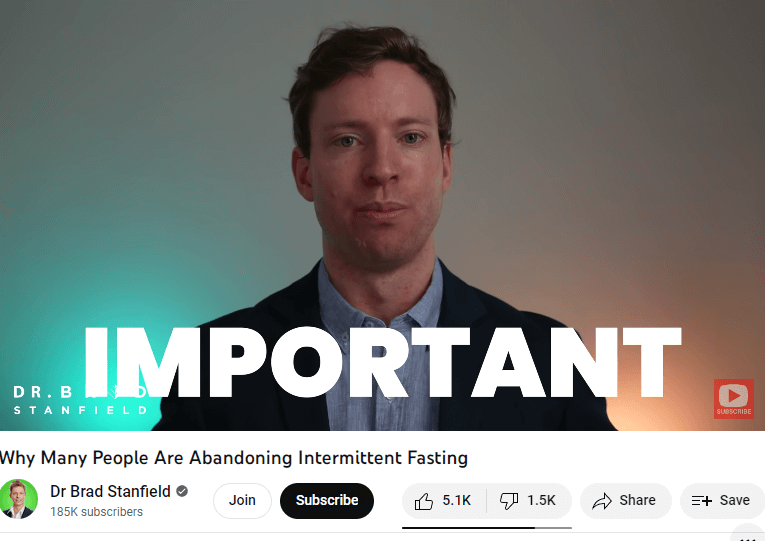
What should we do instead, doctor?
We need to minimize the harm from intermittent fasting. We do this by getting most of our calories in the morning.
I think that’s a great idea. Force yourself to eat in the morning even if you’re not hungry. Then don’t eat much past noon. That way you can be miserable in the morning, while looking forward to a long night of trying to sleep on a hungry stomach. It’s win-win!

The final comment I want to mention was from this viewer, who stated that I “really go back and forth with my advice.”
Other commenters made much the same claim underneath this video. I can easily see the guy being all over the place. His channel has 79 videos, and it’s all “OMFG this study tells us that we need to do TRENDY_THING or else we’ll all get old and die of cancer.”
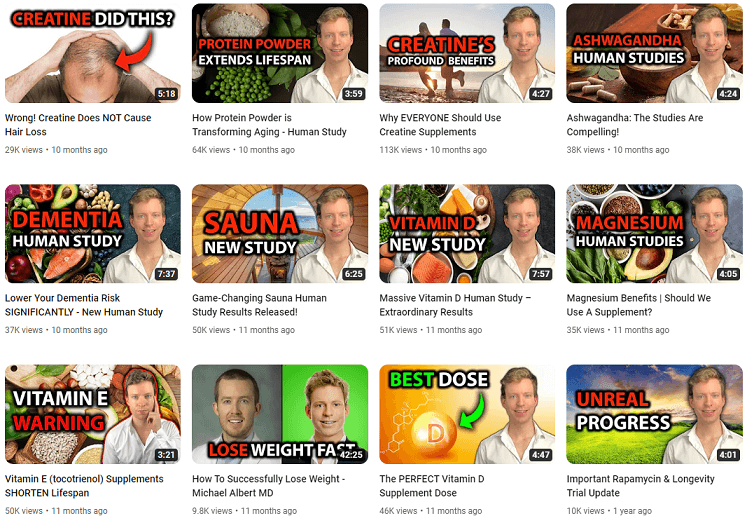
The guy is just one small step above the now defunct Buzzfeed News.

As mentioned earlier, his comment section lays into him. I can’t be bothered to screencap everything, but here is a sample of the commentary.
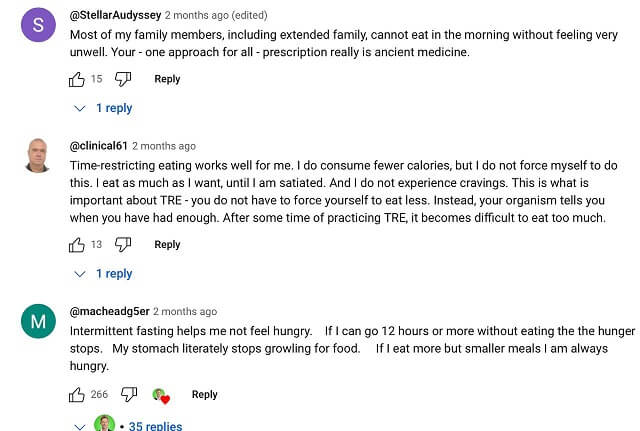
Most of my family members, including extended family, cannot eat in the morning without feeling very unwell. Your – one approach for all – prescription really is ancient medicine.
Here’s one trick to putting on muscle and cutting lbs of fat from your waistline. Remove pseudoscientific novelty takers from your entertainment diet now. Save time, get healthier. Results start instantly!



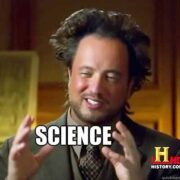




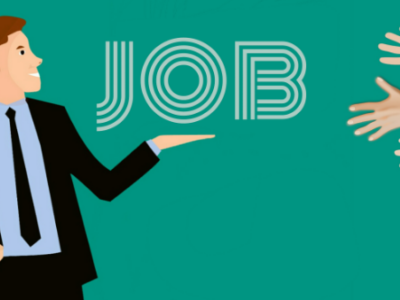

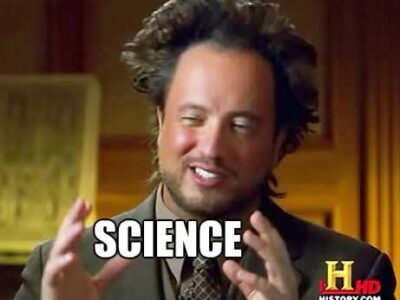
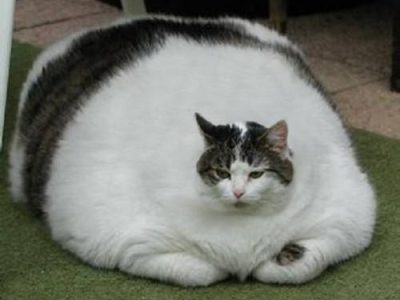




He “debunked” a large meta-analysis using a single study based on “advanced food diary techniques”, aka a self-reported study. It’s the most junk science of junk science, short of outright fraud. All the calorie counting bullshit you talked about would have to be done by everyone in the study to actually know what they’re eating, when in reality *nobody* does that. It’s a shame that our system rewards fraud so much, but this stuff is everywhere in science because of if it.
The best part is that I still don’t understand how they measured “melanin onset,” let alone how this couldn’t correlate to time of day eating. In short, the results make no sense.